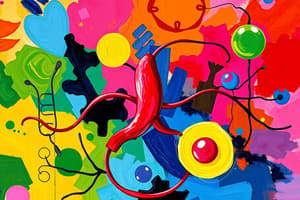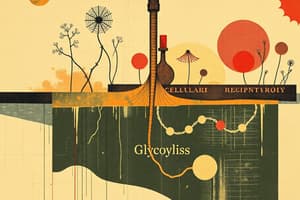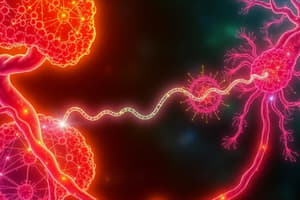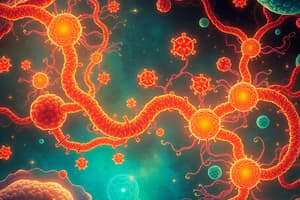Podcast
Questions and Answers
What is the primary use of glyceraldehyde 3-phosphate produced during the final stage?
What is the primary use of glyceraldehyde 3-phosphate produced during the final stage?
- To transport fatty acids to the cytosol
- To produce organic acids
- To regenerate ribulose 1,5-bisphosphate (correct)
- To generate ATP directly
Which process do exported sugars primarily enter after leaving the chloroplast?
Which process do exported sugars primarily enter after leaving the chloroplast?
- Glycolysis (correct)
- Calvin cycle
- Fermentation
- Pentose phosphate pathway
What was the initial method of ATP generation in the first living cells on Earth?
What was the initial method of ATP generation in the first living cells on Earth?
- Citric acid cycle
- Anaerobic fermentation (correct)
- Light-dependent reactions
- Oxidative phosphorylation
What is the role of ATPase in the evolutionary stages of oxidative phosphorylation?
What is the role of ATPase in the evolutionary stages of oxidative phosphorylation?
Which stage of oxidative phosphorylation involves the linking of systems to produce ATP synthase?
Which stage of oxidative phosphorylation involves the linking of systems to produce ATP synthase?
What is the primary role of activated carriers like ATP and NADH in cellular respiration?
What is the primary role of activated carriers like ATP and NADH in cellular respiration?
During glycolysis, what happens to glucose?
During glycolysis, what happens to glucose?
Which stage of cellular respiration takes place in the mitochondria?
Which stage of cellular respiration takes place in the mitochondria?
What is the primary function of the redox reactions in cellular respiration?
What is the primary function of the redox reactions in cellular respiration?
In glycolysis, how many ATP molecules are consumed in the initial steps?
In glycolysis, how many ATP molecules are consumed in the initial steps?
What characterizes the anaerobic process of glycolysis?
What characterizes the anaerobic process of glycolysis?
What are the products of glycolysis for each molecule of glucose?
What are the products of glycolysis for each molecule of glucose?
In the context of cellular respiration, what is the role of NADH?
In the context of cellular respiration, what is the role of NADH?
What is the primary function of mitochondria in cells?
What is the primary function of mitochondria in cells?
Which enzyme complex is the first to receive electrons in the mitochondrial electron transport chain?
Which enzyme complex is the first to receive electrons in the mitochondrial electron transport chain?
What is generated across the inner mitochondrial membrane as protons are pumped into the intermembrane space?
What is generated across the inner mitochondrial membrane as protons are pumped into the intermembrane space?
What is the role of ATP synthase in mitochondria?
What is the role of ATP synthase in mitochondria?
What component accepts electrons from NADH during oxidative phosphorylation?
What component accepts electrons from NADH during oxidative phosphorylation?
Which of the following is NOT part of the mitochondrial electron transport chain?
Which of the following is NOT part of the mitochondrial electron transport chain?
What is the primary function of the light reactions in photosynthesis?
What is the primary function of the light reactions in photosynthesis?
Which mobile electron carrier is involved in the electron transport chain linked to Photosystem II?
Which mobile electron carrier is involved in the electron transport chain linked to Photosystem II?
What process takes place within chloroplasts?
What process takes place within chloroplasts?
What is the role of ATP synthase in the light reactions of photosynthesis?
What is the role of ATP synthase in the light reactions of photosynthesis?
Which component of the mitochondria is responsible for the rapid spinning needed to synthesize ATP?
Which component of the mitochondria is responsible for the rapid spinning needed to synthesize ATP?
In the Calvin Cycle, which enzyme catalyzes the attachment of CO2 to ribulose 1,5-bisphosphate?
In the Calvin Cycle, which enzyme catalyzes the attachment of CO2 to ribulose 1,5-bisphosphate?
Which of the following molecules provides the energy required for the conversion of 3-phosphoglycerate to glyceraldehyde 3-phosphate in the Calvin Cycle?
Which of the following molecules provides the energy required for the conversion of 3-phosphoglycerate to glyceraldehyde 3-phosphate in the Calvin Cycle?
How many molecules of ribulose 1,5-bisphosphate are regenerated for every three molecules of CO2 fixed in the Calvin Cycle?
How many molecules of ribulose 1,5-bisphosphate are regenerated for every three molecules of CO2 fixed in the Calvin Cycle?
What is produced as a byproduct of the light reactions during photosynthesis?
What is produced as a byproduct of the light reactions during photosynthesis?
What type of light energy do Photosystem I and Photosystem II primarily absorb?
What type of light energy do Photosystem I and Photosystem II primarily absorb?
What role does the electron transport chain play in cellular respiration?
What role does the electron transport chain play in cellular respiration?
What is the net yield of activated carrier molecules produced in glycolysis from one molecule of glucose?
What is the net yield of activated carrier molecules produced in glycolysis from one molecule of glucose?
What happens to phosphofructokinase when ATP levels are high?
What happens to phosphofructokinase when ATP levels are high?
How is glycogen broken down to release glucose?
How is glycogen broken down to release glucose?
What happens to pyruvate in the presence of oxygen during cellular respiration?
What happens to pyruvate in the presence of oxygen during cellular respiration?
What is the main cost associated with gluconeogenesis?
What is the main cost associated with gluconeogenesis?
What is the primary function of the citric acid cycle?
What is the primary function of the citric acid cycle?
What structural features of mitochondria support the theory of their bacterial ancestry?
What structural features of mitochondria support the theory of their bacterial ancestry?
Which of the following is produced during one turn of the citric acid cycle?
Which of the following is produced during one turn of the citric acid cycle?
What is the role of molecular oxygen in oxidative phosphorylation?
What is the role of molecular oxygen in oxidative phosphorylation?
Why is the proton gradient important in both oxidative phosphorylation and photosynthesis?
Why is the proton gradient important in both oxidative phosphorylation and photosynthesis?
Which enzyme is responsible for turning on glycolysis when ATP levels are low?
Which enzyme is responsible for turning on glycolysis when ATP levels are low?
Which molecule combines with acetyl groups in the citric acid cycle to form citric acid?
Which molecule combines with acetyl groups in the citric acid cycle to form citric acid?
In which cellular location does gluconeogenesis primarily occur?
In which cellular location does gluconeogenesis primarily occur?
What type of molecules are often derived from intermediates formed in glycolysis and the citric acid cycle?
What type of molecules are often derived from intermediates formed in glycolysis and the citric acid cycle?
What does the pyruvate dehydrogenase complex do to pyruvate?
What does the pyruvate dehydrogenase complex do to pyruvate?
Flashcards
Cellular Respiration
Cellular Respiration
The process by which cells harvest energy from food molecules.
Activated Carriers
Activated Carriers
Small molecules that store energy in high-energy linkages.
Redox Reactions
Redox Reactions
Reactions where electrons are transferred between molecules.
Glycolysis
Glycolysis
Signup and view all the flashcards
Glycolysis Location
Glycolysis Location
Signup and view all the flashcards
Catabolism
Catabolism
Signup and view all the flashcards
Pyruvate
Pyruvate
Signup and view all the flashcards
Citric Acid Cycle
Citric Acid Cycle
Signup and view all the flashcards
Glycolysis Net Yield
Glycolysis Net Yield
Signup and view all the flashcards
Pyruvate's Fate: Aerobic vs. Anaerobic
Pyruvate's Fate: Aerobic vs. Anaerobic
Signup and view all the flashcards
Pyruvate Dehydrogenase Complex
Pyruvate Dehydrogenase Complex
Signup and view all the flashcards
What does the citric acid cycle produce?
What does the citric acid cycle produce?
Signup and view all the flashcards
Citric Acid Cycle Location
Citric Acid Cycle Location
Signup and view all the flashcards
What is oxidative phosphorylation?
What is oxidative phosphorylation?
Signup and view all the flashcards
Role of Oxygen in Oxidative Phosphorylation
Role of Oxygen in Oxidative Phosphorylation
Signup and view all the flashcards
Anabolic Pathways
Anabolic Pathways
Signup and view all the flashcards
Electron Transport Chain
Electron Transport Chain
Signup and view all the flashcards
Proton Gradient
Proton Gradient
Signup and view all the flashcards
Oxidative Phosphorylation
Oxidative Phosphorylation
Signup and view all the flashcards
Gluconeogenesis
Gluconeogenesis
Signup and view all the flashcards
Phosphofructokinase
Phosphofructokinase
Signup and view all the flashcards
Allosteric Regulation
Allosteric Regulation
Signup and view all the flashcards
Glycogen
Glycogen
Signup and view all the flashcards
Glycogen Phosphorylase
Glycogen Phosphorylase
Signup and view all the flashcards
Mitochondrial Compartments
Mitochondrial Compartments
Signup and view all the flashcards
Mitochondrial Membranes
Mitochondrial Membranes
Signup and view all the flashcards
ATP Production Location
ATP Production Location
Signup and view all the flashcards
Electron Transport Chain Components
Electron Transport Chain Components
Signup and view all the flashcards
Electron Transport Chain Order
Electron Transport Chain Order
Signup and view all the flashcards
Proton Pumping
Proton Pumping
Signup and view all the flashcards
Redox Potential Gradient
Redox Potential Gradient
Signup and view all the flashcards
ATP Synthesis
ATP Synthesis
Signup and view all the flashcards
What is the main purpose of the Calvin cycle?
What is the main purpose of the Calvin cycle?
Signup and view all the flashcards
What is the fate of pyruvate?
What is the fate of pyruvate?
Signup and view all the flashcards
What is the role of oxidative phosphorylation?
What is the role of oxidative phosphorylation?
Signup and view all the flashcards
What is the purpose of ATPase in early life?
What is the purpose of ATPase in early life?
Signup and view all the flashcards
What is the main difference between glycolysis and fermentation?
What is the main difference between glycolysis and fermentation?
Signup and view all the flashcards
Photosystem II
Photosystem II
Signup and view all the flashcards
Electron Transport Chain (Light Reactions)
Electron Transport Chain (Light Reactions)
Signup and view all the flashcards
Photosystem I
Photosystem I
Signup and view all the flashcards
Calvin Cycle
Calvin Cycle
Signup and view all the flashcards
Rubisco
Rubisco
Signup and view all the flashcards
3-phosphoglycerate
3-phosphoglycerate
Signup and view all the flashcards
Glyceraldehyde 3-phosphate (G3P)
Glyceraldehyde 3-phosphate (G3P)
Signup and view all the flashcards
Study Notes
Cellular Respiration
- Cellular respiration harvests energy from food molecules, capturing it in high-energy bonds like ATP and NADH.
- Redox reactions involve electron transfer, with a change in free energy (ΔG) determining feasibility.
- Redox pairs, like NADH/NAD+, convert through gain or loss of electrons.
- Food breakdown (catabolism) happens in three stages: digestion, glycolysis, and the citric acid cycle.
Glycolysis
- Glycolysis splits glucose into two pyruvate molecules, generating ATP and NADH.
- It's an anaerobic process, requiring no oxygen.
- It occurs in the cytoplasm.
- Glycolysis steps involve energy investment (steps 1-3), cleavage (4-5), and energy generation (6-10).
- Each glucose molecule generates two ATP and two NADH.
- Pyruvate is converted into Acetyl CoA.
Citric Acid Cycle
- The citric acid cycle, also known as the Krebs cycle or TCA cycle, completes the oxidation of carbon atoms.
- It occurs in the mitochondrial matrix.
- The cycle oxidizes acetyl CoA, generating NADH, FADH2, GTP/ATP, and CO2.
- Many intermediates are diverted to anabolic pathways (amino acids, nucleotides, lipids).
Oxidative Phosphorylation
- This is the final step of food oxidation, adding a phosphate group to ADP forming ATP.
- Molecular oxygen is the final electron acceptor.
- FADH2 and NADH release electrons to electron transport chain (ETC).
- The ETC creates a proton gradient across the inner mitochondrial membrane.
- This gradient fuels ATP synthesis via ATP synthase.
- Complete glucose oxidation generates about 30 ATP molecules.
Gluconeogenesis
- Gluconeogenesis produces glucose from pyruvate.
- Enzymes like phosphofructokinase are crucial, and their activity is regulated.
- It's an energy-intensive process, needing ATP and GTP.
Chapter 14: Mitochondria and Chloroplasts
- Mitochondria and chloroplasts are thought to have evolved from bacteria.
- They have their own DNA, ribosomes, and reproduce independently.
- Mitochondria are crucial for ATP production.
- Mitochondrial structure includes inner and outer membranes, matrix, and ribosomes.
- The electron transport chain (ETC) in mitochondria has three complexes.
- NADH donates electrons to the ETC, and electrons move through complexes, pumping protons (H+) out of the matrix.
- The proton gradient drives ATP synthesis.
Photosynthesis
- Photosynthesis occurs in chloroplasts.
- Photosystem II captures light energy and transfers it to a mobile electron carrier.
- Photosystem I produces NADPH.
- The light-dependent reactions generate ATP and NADPH, while the light-independent reactions use ATP and NADPH to synthesize sugars from CO2.
Chloroplast Structure
- Chloroplasts have an outer and inner membrane, stroma, and thylakoid membranes.
Studying That Suits You
Use AI to generate personalized quizzes and flashcards to suit your learning preferences.





